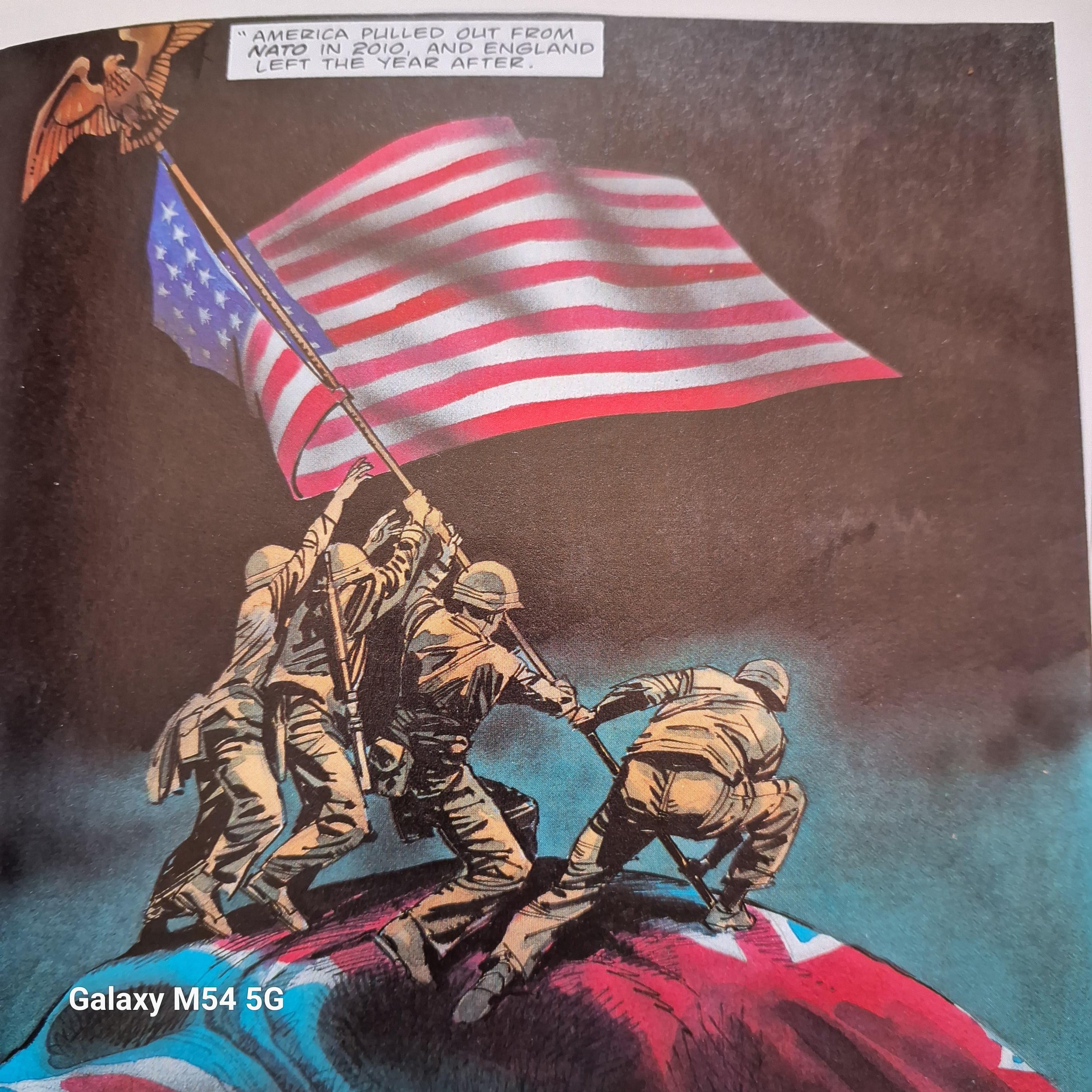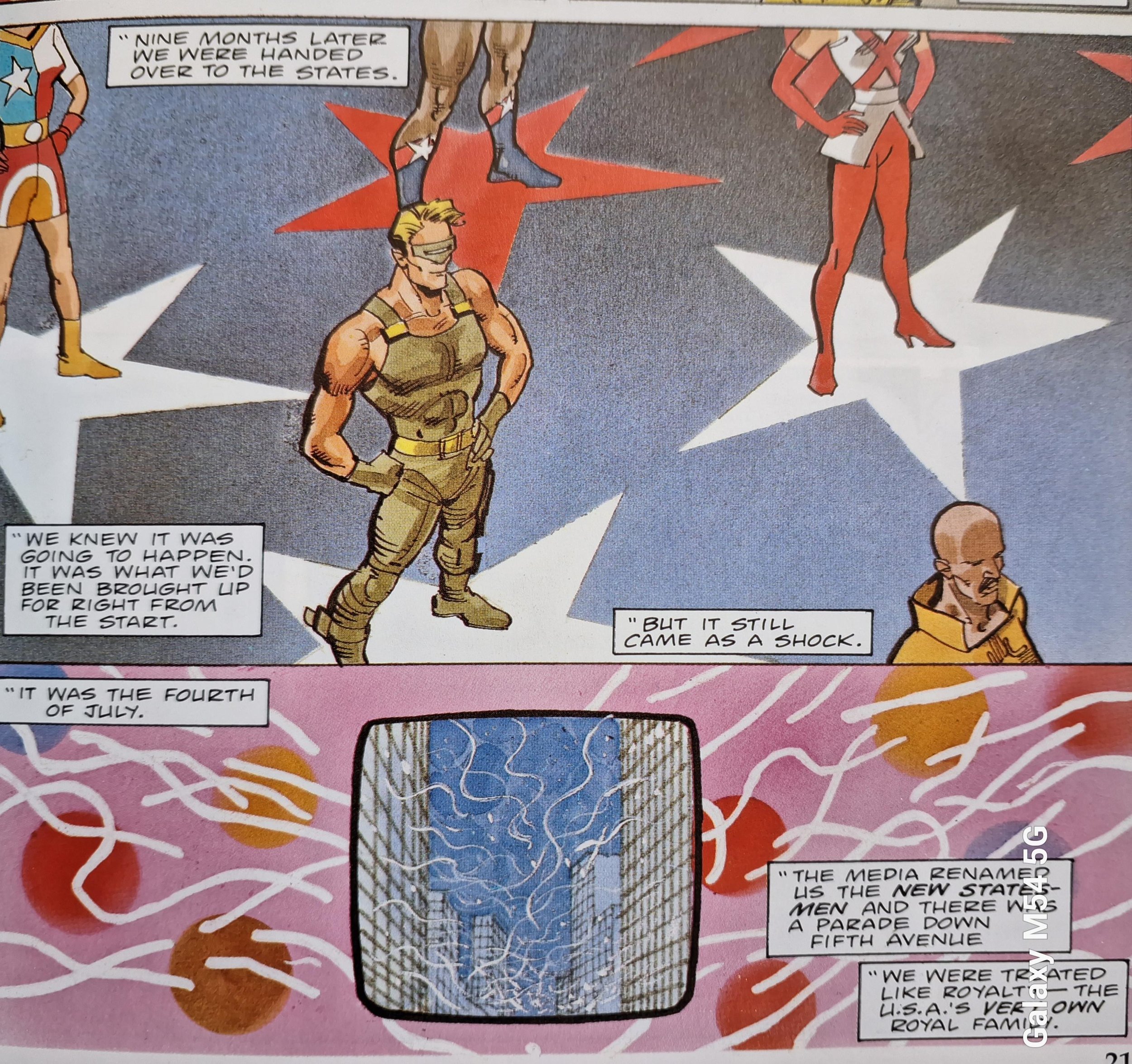“New Statesmen” #1-3
This review was comissioned by @Septentrion.
My apologies for the cell phone photos; scanning things is difficult in my present situation.
"New Statesmen" is an obscure British comic that ran in Crisis from 1988 to 1989. Part of the reason for its obscurity seems to be that it's a very long, convoluted, mystery-focused, multi-narrative story, but it ran in serial format in 14-page chunks once every two weeks. New and lapsed readers found it impenetrable, and even persistent readers found it hard to follow. The creators, including lead writer John Smith and lead illustrator Jim Baikie, had to fight tooth and nail to be allowed to publish the story through to completion.
Granted, the author's note apologizes for the complete graphic novel edition being too dense and overwhelming because it was meant to be read in 14-page chunks once every two weeks. But the author's assessment seems to run counter to the general consensus here.
Anyway, if its original run had been in a format that the story was better suited for, perhaps it wouldn't be so obscure today.
Granted, that's not the only eyebrow-raiser in the author's note:
And that's just the first half a page. It's all like this for the entire two pages of microscopic print.
Happily, the weasel-worded apology for the story ahead and its accompanying golf course worth of red flags had me expecting something worse than what these first three issues actually contain. That's not to say there aren't issues, though. Like the author simultaneously brags about and begs forgiveness for, this story takes off in media res with a million characters buried neck-deep in a complicated geopolitical situation involving acronymous factions and coalitions that aren't yet defined or explained. The story seems...potentially...interesting, but it doesn't explain itself very well, and I have some misgivings about where it might be going.
There's a historical background chapter, but it does this weird thing where it explains several decades of in-universe history as if to an outsider, but also drops fictional names and acronyms as if the reader is expected to recognize them. Sort of half-assing both approaches, imo. I'll summarize it as best I can, but I might be misunderstanding some details even after rereading it.
In this timeline's 1980's, close to the comic's real-life date of publication, US President Reagan's "Star Wars" initiative was covertly abandoned and used as a cover for a black budget genetic engineering program called "Hephaestus." The USA nabbed a dream team of brilliant geneticists and, with unlimited money that the public thought was being used for satellite defences, cracked the human genome and the key to manipulating it. Furthermore, they found long-dormant genes that code for psychic powers that natural selection apparently worked against for some reason.
They burned through a lot of human test subjects, but since when has that stopped anyone?
By the beginning of the twenty-first century, the first generation of "optimen" were being raised in secret. Other genetic discoveries of Hephaestus were slowly released to the public, either deliberately to fatcat corporations or through various leaks and breaches. The biotech revolution, or "soft revolution" as history would remember it, was out in the wild and snowballing faster with every passing year.
Gengineered consumer goods and medical treatments were well and good. The bioweapons that started showing up in the hands of terrorists and rogue states, not so much. Multiple genocides-by-ethnically-targeted-virus happened in the first three decades of the 21st century. As the world order crumbled, America started using its secret brainwashed optiman black operatives to counteract it and expand US dominance over the post-coldwar world.
Some of the ensuing political developments I'm...um...less than sure of, though.
England apparently becomes the fifty-first United State.
It's...sort of implied that Scotland didn't follow it (no mention of Ireland or Wales one way or the other), so I guess the United Kingdoms stopped being a thing at some point? I guess?
There's also talk about "Commonwealth" countries later on, and from context it *seems* like that's referring to the British Commonwealth, which...I guess maybe those are all US territories now? Maybe?
Some timelines get Brexit. Others get Bramerica.
Somehow.
On one hand, this comic was written before the European Union even existed, so it's a different political landscape. On the other hand...just no. At least, not without a really, really compelling reason, which hasn't yet been provided.
The timeline gets harder to follow after this point, but the gist of it is that the European Economic Community members end up allying with the USSR (which still exists by the 2030's, apparently. This comic was written literally right before the Berlin Wall came down with a contemporary point of departure that takes years to have any effect on the course of history, so uh, not very good political prediction from the authors here) against the United States of America and Also the British Commonwealth, brushfire wars break out all over the world as it decays under the ravages of bio and psionic terrorism, and the optimen get deployed in ever more parts of the world to bring down the western jackboot. Eventually, their existence became publically known. While the USAABC was using them to prop up Apartheid South Africa (also still a thing in the 2030's) and also to mass murder political dissidents and uppity immigrant groups in England.
SOMEHOW, the political fallout from this discovery resulted in the optimen being disbanded and...turned...over...to the...state governments? The fuck?
And, um. The optimen apparently were raised with the expectation that this would eventually be done. Uncle Sam was always planning to disband its superpowered black ops unit (with the exception of the one squad who were caught on camera massacring white people instead of brown people, who were simply buried deeper into federal obfuscation) and give each state its own superhero outside of federal control.
What the actual, living, breathing fuck?
Anyway. The chaos, predictably, got worse. Extremist groups are pulling the biotech-ravaged world apart in different directions, and omnimen are starting to go off-script in directions of their own. One optiman in particular - callsign of Phoenix, since he was assigned to Arizona - makes a bid for US President as an independent, Christian Dominionist candidate whose convinced a bunch of people that his powers are divine (as opposed to those of the other "New Statesmen" and their ilk, whose powers are not divine). Another major incident related to the west's sharp rightward turn involved the bombing of a gay bathhouse that a optiman happened to be inside of at the time. Resulting in the disintegration of a man said optiman had been about to bang, and subsequently an ass-naked public rampage in which he tore the culprits apart with his bare hands and wiping out half the city's power grid before eventually going down to sustained police fire.
Anyway. The story's present is after all this, in September of 2064. The world is an apocalyptic horrorshow of bioweapons, mutants, psionic WoMD's, and weirder things (ley lines and the weaponization thereof are a thing that get mentioned a few times). Someone (heavily implied to be optiman turned New Statesman turned President turned god-king Phoenix) has set up a bloody dictatorship over much of the remaining western world and is hunting rival optimen to extinction. The surviving superhumans are sneaking around in little forager gangs and hiding in the ruins and such. And also being awful to each other, because of course.
There's talk of sexual exploitation going on within the survivor gangs as well.
Peeking ahead, I think that the entire series might be the historical leadup to this status quo. So, "how it all went to shit: the cape comic." There may or may not be a final chapter that has them resolving the main conflict in the 2064 present.
I didn't want to say this, but after a reread there's no avoiding this impression. "New Statesmen" started coming out less than two years after "Watchmen" did, and (at least so far) it just seems like a dumber, less politically literate version of Watchmen.
Everyone and their mother would try to ape Watchmen in the following fifteen years' worth of superhero comics, but this seems like an especially early and especially shameless example. All the way down to the in-universe excerpts from scientists and reporters blathering about the grim philosophical implications of superhumans existing, the American war crimes squad going domestic and semi-independent, and the gay superhero getting hate crime'd.
The biopunk and apocalyptic elements are different and potentially interesting at least, but I'm sceptical that they'll be enough. On top of being overly derivative, these first three chapters are also guilty of the number one sin that ruined so many of the Watchmen imitators: relentless edge. There are no relative innocents like Nite Owl and Silk Specter to contrast the cynical murderhobos against. The gay cape who got caught in a homophobic terror attack wasn't a relative blank slate like Silhouette; he was explicitly one of the participants in the England protest massacre who had to be kept incognito after the New Statesmen move. POV narrator makes mouth noises about good intentions being corrupted and the world getting worse instead of better like they thought, but then the backstory *starts* with horrific human experimentation described and illustrated in needlessly gruesome detail. The inter-chapter texts are all either reviews of criminal exposes on the New Statesmen, or unconvincingly scholarly articles about their sexuality. Nothing like Nite Owl I's grandfatherly memoirs, or the Doctor Manhattan commentaries with their nuanced mix of terror and wonder.
The art is okay. The biopunk stuff might potentially be interesting. And hey, the story itself might find its footing and do a better job of things after the first few issues. So far though, I'm very much unimpressed.




